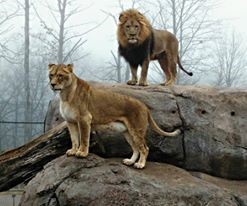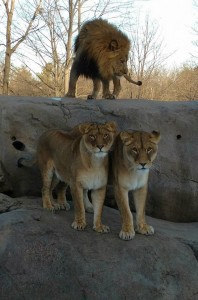There are few animals as iconic as the African lion. Nicknamed “King of the Jungle” and synonymous with pride, bravery, and strength, the lion has been ingrained in our culture for countless decades. But like many revered animals, the true nature and behavior of the African lion is often misunderstood. With Celebrate Lions Day coming up at the Zoo on Saturday, April 15, here are some interesting facts about these spectacular cats and their importance in maintaining a healthy ecosystem in Africa.


Despite their impressive hunting skills and social living groups, lions face a multitude of threats including loss of habitat, trophy and retaliation hunting, and the introduction of diseases from domestic cattle. Without lions, prey species populations experience unchecked growth that can create problems for other animals and humans alike. When lions are protected, they keep herbivore and smaller predator species in check and provide residents with opportunities for income through eco-tourism.
Our Zoo is home to three adult African lions: Chester, Zuri, and Asha. The three have lived together since coming to the Zoo in 2012 for the opening of A Step Into Africa. A lot goes into caring for these intelligent animals. As one of their keepers, I am responsible for providing them with stimulating enrichment. Lions have an incredible sense of smell and enjoy searching for the spices, perfumes, and even elephant droppings that may be hidden on exhibit.


Training is also a large component of their care. Almost every day I sit down with the lions (on the opposite side of the mesh, of course!) and work on training them to do behaviors that allow them to take an active role in their own healthcare. Important behaviors include showing me their paws and opening their mouths for visual inspections. The vet staff also comes down to help with voluntary vaccinations and radiographs. When the lion performs the correct behavior, they are rewarded with a meatball or other meaty treat. This way, they associate physical exams with receiving rewards and their relationship with the animal care staff is strengthened.
I hope that this year’s Celebrate Lions Day will give people a new appreciation for the Zoo’s lions and their counterparts in Africa. Chester, Zuri, and Asha are ambassadors for their species, and I encourage you to take some extra time during your visit to stop at the various stations to learn more about their adaptations, care, and conservation.— James Weinpress, Zoo KeeperGO TO CELEBRATE LIONS DAY








